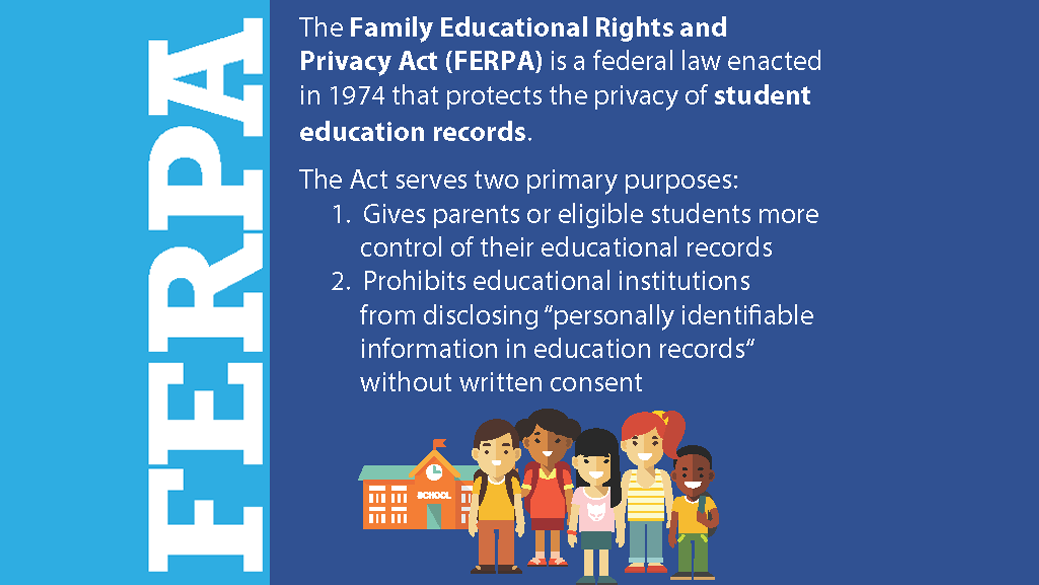A .gov website belongs to an official government organization in the United States.
A lock ( ) or https:// means you've safely connected to the .gov website. Share sensitive information only on official, secure websites.
- Public Health Counsel Partners
- About the Public Health Law Program
- CDC Public Health Law Educational Opportunities
- Tribal Public Health
- Publications and Resources
- Health Information & Privacy
- Public Health Law News
- Training Resources
- Technical Assistance
- Coroner and Medical Examiner Laws
- View All Home

Family Educational Rights and Privacy Act (FERPA)
What to know.
The Family Educational Rights and Privacy Act (FERPA) is a federal law enacted in 1974 that protects the privacy of student education records. FERPA applies to any public or private elementary, secondary, or post-secondary school. It also applies to any state or local education agency that receives funds under an applicable program of the US Department of Education.

Parents’ or Eligible Students’ Rights
Parents or eligible students have the right to take the following actions:
- Inspect and review the student's education records maintained by the school. Schools do not have to provide copies of records unless it is impossible for parents or eligible students to review the original records (e.g., they live far away).
- Request that a school correct records they believe to be inaccurate or misleading. If the school decides not to change the record, the parent or eligible student then has the right to a formal hearing. After the hearing, if the school still decides not to change the record, the parent or eligible student has the right to place a statement with the record that explains his or her view about the contested information.
- Stop the release of personally identifiable information.
- Get a copy of the institution's policy concerning access to educational records.
Schools need written permission from the parent or eligible student to release any information from a student's education record. Schools that do not comply with FERPA risk losing federal funding. Because parochial and private schools at the elementary and secondary levels generally do not receive funding under any program administered by the US Department of Education, they are not subject to FERPA. Private postsecondary schools, however, generally do receive such funding and are subject to FERPA.

Permitted Disclosures
FERPA allows schools to disclose information from a student's education record, without consent, to the following parties or under the following conditions:
- School officials with legitimate educational interest
- Other schools to which a student is transferring
- Specified officials for audit or evaluation purposes
- Appropriate parties in connection with financial aid to a student
- Organizations conducting certain studies for, or on behalf of, the school
- Accrediting organizations
- Appropriate officials in cases of health and safety emergencies
- State and local authorities, within a juvenile justice system, pursuant to specific state law
- To comply with a judicial order or lawfully issued subpoena
For more information, visit the US Department of Education's FERPA website .
- Protecting Student Privacy: Frequently Asked Questions . US Department of Education.
Public Health Law
The Public Health Law Program works to improve the health of the public by developing law-related tools and providing legal technical assistance to public health practitioners and policy makers in state, tribal, local, and territorial (STLT) jurisdictions.
Health Care Providers
Public health.

IMAGES
COMMENTS
FERPA gives parents or eligible students the right to inspect, review, and correct their education records, and to limit the release of their information. Learn about FERPA's application, rights, and permitted disclosures from CDC's Public Health Law website.
FERPA is a federal law that regulates access and disclosure of student education records by public entities. It grants parents and eligible students privacy rights over their records, and allows some exceptions for certain situations such as peer-grading and medical records.
FERPA is a law that gives parents and eligible students the right to access, amend, and control their education records. Learn about FERPA's statute, regulations, audience, and topics from the official website of the U.S. Department of Education.
FERPA is a federal law that gives parents and eligible students the right to access, review, and control their education records. Learn about the regulations, rights, and enforcement procedures of FERPA from the official source.
FERPA is a federal law that guarantees the privacy of student education records for students and their parents. It applies to all schools that receive funds from the U.S. Department of Education and allows schools to disclose records in certain situations, such as health or safety emergencies, law enforcement, or transfer.
FERPA is a federal law that protects the privacy of student education records. Learn about the legislation, regulations, guidance, and resources related to FERPA and student data sharing.
FERPA is a federal law that regulates the handling of student records by schools that receive federal funds. It grants parents access and consent rights, but also allows limited disclosure of records in certain situations. Learn about FERPA's definition, exceptions, enforcement, and interaction with other laws.
FERPA is a federal law that protects student privacy and access to education records. It covers the rights of parents and students, the exceptions and limitations of disclosure, and the enforcement of violations.
Learn about the Family Educational Rights and Privacy Act (FERPA), a federal law that protects the privacy of student education records. Find out your rights and responsibilities as an eligible student, such as access, amendment, and disclosure of records.
This guidance document reviews parents' rights under the PPRA and education officials' obligations in implementing the PPRA. The PPRA applies to the programs and activities of a State educational agency (SEA), local educational agency (LEA), or other recipient of funds under any program funded by the U.S. Department of Education.